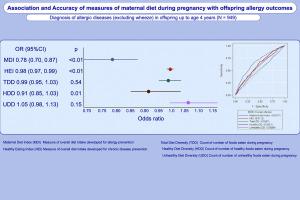The Journal of Allergy and Clinical Immunology: In Practice ( IF 9.4 ) Pub Date : 2022-09-21 , DOI: 10.1016/j.jaip.2022.09.009 Carina Venter 1 , Michaela P Palumbo 2 , Deborah H Glueck 3 , Katherine A Sauder 3 , Wei Perng 4 , Liam O'Mahony 5 , Kaci Pickett 6 , Matthew Greenhawt 1 , David M Fleischer 1 , Dana Dabelea 7

|
Background
Allergic diseases in children are increasing. Although maternal diet quality in pregnancy may be protective, it is unclear which measure of maternal diet best predicts offspring diseases.
Objective
To examine the associations between multiple diet measures and allergy outcomes, and to compare the diagnostic accuracy of the measures for the prediction of allergy outcomes.
Methods
Maternal diet during pregnancy was measured using a validated instrument, and scored using 5 measures: the maternal diet index (MDI), Healthy Eating Index, total diet diversity, healthy diet diversity, and unhealthy diet diversity. Unadjusted and adjusted logistic regression models assessed associations between maternal diet measures and offspring allergy outcomes up to age 4 years. The diagnostic accuracy of the diet measures was compared.
Results
There were significant associations between MDI (odds ratio [OR], 0.78; 95% CI, 0.70-0.87), Healthy Eating Index (OR, 0.98; 95% CI, 0.97-0.99), and healthy diet diversity scores (OR, 0.91; 95% CI, 0.85-0.98) during pregnancy and the primary combined outcome “any allergy excluding wheeze” in children up to age 4 years. Neither maternal total diet diversity (OR, 0.99; 95% CI, 0.95-1.03) nor unhealthy diet diversity scores (OR, 1.05; 95% CI, 0.98-1.13) were associated with the “any allergy excluding wheeze” outcome. For all outcomes studied, except for food allergy, there was a significant difference in the diagnostic accuracy between the 5 measures of maternal diet. The area under the curve for MDI was highest for every disease outcome, although not always significantly higher.
Conclusions
Better quality and higher diversity of a woman’s diet during pregnancy, measured in various ways, is associated with offspring allergy outcomes, with healthy foods associated with decreased risk, and unhealthy foods associated with a higher risk. The MDI, which appropriately weighted both healthy and unhealthy foods, best predicted childhood allergic disease.
中文翻译:

比较孕期母亲饮食措施对后代过敏结果的诊断准确性:健康开始研究
背景
儿童过敏性疾病正在增加。尽管孕期母亲的饮食质量可能具有保护作用,但尚不清楚母亲饮食的哪种衡量标准最能预测后代疾病。
客观的
检查多种饮食措施与过敏结果之间的关联,并比较这些措施预测过敏结果的诊断准确性。
方法
使用经过验证的仪器测量孕期母亲的饮食,并使用 5 项指标进行评分:母亲饮食指数 (MDI)、健康饮食指数、总饮食多样性、健康饮食多样性和不健康饮食多样性。未调整和调整后的逻辑回归模型评估了母亲饮食措施与 4 岁以下后代过敏结果之间的关联。比较了饮食措施的诊断准确性。
结果
MDI(比值比 [OR],0.78;95% CI,0.70-0.87)、健康饮食指数(OR,0.98;95% CI,0.97-0.99)和健康饮食多样性评分(OR,0.91)之间存在显着关联; 95% CI, 0.85-0.98) 在怀孕期间和 4 岁以下儿童的主要综合结果“除喘息外的任何过敏”。母亲总饮食多样性(OR,0.99;95% CI,0.95-1.03)和不健康饮食多样性评分(OR,1.05;95% CI,0.98-1.13)均与“除喘息外的任何过敏”结果无关。对于研究的所有结果,除了食物过敏外,5 种产妇饮食测量的诊断准确性存在显着差异。MDI 曲线下的面积对于每种疾病结果都是最高的,尽管并不总是显着更高。
结论
以各种方式衡量的女性在怀孕期间饮食的质量和多样性与后代过敏结果相关,健康食品与风险降低相关,不健康食品与风险较高相关。适当加权健康和不健康食物的 MDI 最能预测儿童过敏性疾病。



























 京公网安备 11010802027423号
京公网安备 11010802027423号